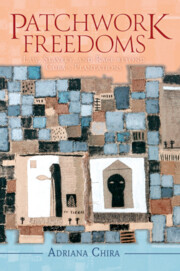Book contents
- Patchwork Freedoms
- Afro-Latin America
- Patchwork Freedoms
- Copyright page
- Dedication
- Contents
- Figures
- Maps
- Tables
- Acknowledgments
- Manuscript Sources and Abbreviations
- Note on Language and Region
- Maps
- Introduction
- 1 Unenclosed People, Unenclosed Lands
- 2 Foreign Implants
- 3 Keeping People Put
- 4 Manumission’s Legalities
- 5 “A Freedom with Further Bonds”
- 6 “Para levantar los negros y proclamar la República”
- Conclusion
- Book part
- Bibliography
- Index
5 - “A Freedom with Further Bonds”
Free People of African Descent, Property Ownership, and Color Status
Published online by Cambridge University Press: 10 February 2022
- Patchwork Freedoms
- Afro-Latin America
- Patchwork Freedoms
- Copyright page
- Dedication
- Contents
- Figures
- Maps
- Tables
- Acknowledgments
- Manuscript Sources and Abbreviations
- Note on Language and Region
- Maps
- Introduction
- 1 Unenclosed People, Unenclosed Lands
- 2 Foreign Implants
- 3 Keeping People Put
- 4 Manumission’s Legalities
- 5 “A Freedom with Further Bonds”
- 6 “Para levantar los negros y proclamar la República”
- Conclusion
- Book part
- Bibliography
- Index
Summary
The local courts in Santiago also turned to custom to establish the rights and obligations of freed individuals even after letters of manumission had been issued. Even after becoming formally free, manumitted individuals could still be indebted to others. A vast historiography has explored manumission networks primarily from a social perspective, as avenues into freedom. But these networks also had legal effects. Inside the courts, it was members of those very same networks who helped judges clarify how much work debtors should do and what kinds of rights they enjoyed. While constraining, such networks also constituted the foundations of an emerging system of emancipation from below with free people of African descent as its main nodes. As enslaved people became free, they enslaved others whom they freed conditionally on their death. The effect of this pattern was an accelerating manumission rate and, with it, growing expectation among enslaved people to attain freedom. Frequent manumission also helped unfix color statuses within Santiago. Some santiagueros of African descent used color taxonomies to conceive of positions within local hierarchies originating in manumission.
Keywords
- Type
- Chapter
- Information
- Patchwork FreedomsLaw, Slavery, and Race beyond Cuba's Plantations, pp. 180 - 224Publisher: Cambridge University PressPrint publication year: 2022

